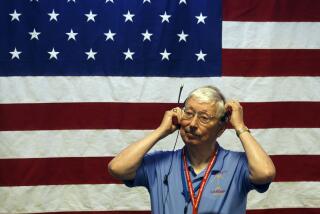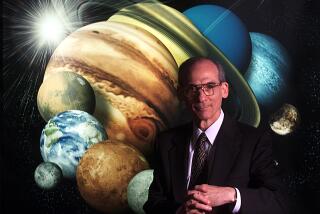Tim Rutten: The spirit of Spirit
History’s unexpected symmetries are endlessly instructive.
We passed through one of those Wednesday, when the scientists and engineers at the Jet Propulsion Laboratory in La Cañada Flintridge announced that the rover Spirit’s seven-year exploration of Mars had come to an end. Originally designed to send back data on a few hundred yards of the Red Planet for just three months, Spirit roamed for miles over years before giving up the ghost to a bitter Martian winter. Its epic journey fundamentally changed our understanding of the most Earth-like of the other planets. And its robotic twin, Opportunity, continues to explore the other side of Mars.
“What’s most remarkable to me about Spirit’s mission is just how extensive her accomplishments became,” said Cornell University’s Steve Squyres, the rovers’ principal investigator. “What we initially conceived as a fairly simple geologic experiment on Mars ultimately turned into humanity’s first real overland expedition across another planet.”
As it happens, Wednesday also was the 50th anniversary of that famous speech in which President Kennedy urged Congress to commit the nation to “landing a man on the moon and returning him safely to the Earth” within a decade. The country rose to Kennedy’s challenge, and the great era of manned spaceflight culminated in a handful of voyages to the moon before the expense of deep-space exploration and doubts about its benefits narrowed the space program’s focus to orbital missions closer to home — the shuttle and the International Space Station, among others. Now even the shuttle program is coming to a close; on Wednesday, Pratt & Whitney Rocketdyne began sending layoff notices to 300 workers employed on the shuttle program, many of them in the San Fernando Valley.
Along the way there also were sobering reminders that space exploration would have more than a financial cost — the deaths of astronauts in training mission plane crashes and in the Apollo 1 fire, the near-disaster of Apollo 13 and the loss of two shuttles and their crews.
Even so, no one quite foresaw that man would go to the moon — and then, just stop going. Equally unforeseen, no one quite imagined that the spirit of Kennedy’s admonition would live on in the teams of scientists who devised new generations of robotic creations that could explore the solar system not as humanity’s surrogates but as our extensions. The “right stuff,” as it turns out, turned up in pocket protectors.
It now seems clear that when future generations consider the history of humanity’s quests into the unknown, they will consider a campus in suburban Los Angeles alongside such great seats of exploration as the Venetian Republic, the courts of Castile and Lisbon and the great learned societies of London and New York that propelled the era of polar expeditions.
And yet, there were doubts about the manned space program from the start. On Wednesday, the Kennedy museum released tapes of a conversation between the president and then-NASA Administrator James Webb in which the chief executive worried that the moon landing might turn out to be little more than an expensive “stunt.” As Kennedy told Webb just two years after his famous speech, “This looks like a hell of a lot of dough to go to the moon.” Kennedy even questioned whether manned flight was necessary because “you can learn most of that you want scientifically through instruments.”
Surely, humankind always will feel the urge to go and see for itself. It may have been that obscure prompting, as much as the desire for new hunting grounds, that first sent our ancestors out of Africa all those eons ago. There always will be among us those exceptional individuals willing to hazard their lives for the sake of exploration. But one of the crucial insights we’ve gained by looking homeward from the vantage point of space is just how rare and fragile our planetary refuge is, and how precarious and precious the web of living things it sustains can be.
Perhaps we really will have arrived somewhere when we honor our explorers’ sacrificial impulse but restrain the gesture. One day, our descendents may look back at the exploration of the solar system guided from JPL and recall that it was because of what happened there that humankind finally learned to value its inquisitiveness and ingenuity as much as it did its endurance and audacity.
More to Read
A cure for the common opinion
Get thought-provoking perspectives with our weekly newsletter.
You may occasionally receive promotional content from the Los Angeles Times.










